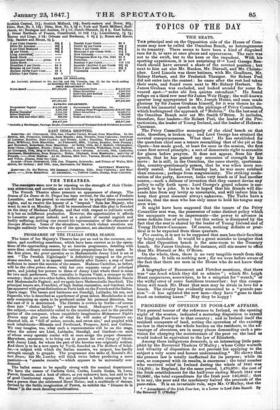PROGRAMME OF THE ITALIAN OPERA SEASON.
The lessee of her Majesty's Theatre has put an end to the rumours, sur- mises, and conflicting assertions' which have been current as to the opera- tions of the approaching season, by an interim programme, detailing with more than ordinary minuteness the various preparations he has made. In the first place, the great question as to Mademoiselle Jenny Lind is set at rest. "The Swedish Nightingale" is definitively engaged as the prima donna assoluta, and is to appear immediately after Easter; a step of itself sufficient to insure the success of the season. Madame Castellan, as before, will be the altra prima donna, with her own separate range of principal parts, and joining her powers to those of Jenny Lind where there is room for two such performers. The contralto is Signora Vietti, a stranger to this country; there are two other ladies, hitherto unknown here Madame Nascio and Mademoiselle Fagiani; and we again have Mademoiselle Sanchioli. The principal tenors are, Praschini, of high Italian reputation, and Gardoni, who has appeared with great distinction at Paris both on the French and the Italian Opera stage. The basses and baritones are Staudigl, Lablache, his son, and Superchi, who is described as a performer of great talent. Mendelssohn is not only composing an opera to be produced under his personal direction, but the cast of it is determined. The libretto is written by Scribe—of course done into " choice Italian" by another hand. Shakspere's Tempest is the subject,—one admirably suited to the musical stage, and to the peculiar genius of the composer, whose exquisitely imaginative Midsummer Night's Dream may give some idea of what he will make of Prospero's en- chanted isle, so "full of noises, sounds, and sweet airs," and peopled with such inhabitants—Miranda and Ferdinand, Prospero, Ariel, and Caliban. We may imagine, too, what such a representation will be on the stage, when the actors are Lind, Lablache, Staudigl, and Gardoni—to each of whom every operatic reader will at once assign the proper character. Meyerbeer, moreover, is to bring out in person his own Camp of Silesia, with Jenny Lind, for whom the part of the heroine was originally written. And there is to be a new opera by Verdi, founded on The Robbers of Schil- ler —a subject with which the Italian maestro we suspect, has hardly strength enough to grapple. The programme also talks of. Rossini's Ro- bert Bruce; but Mr. Lumley will think twice before producing a mere pasticcio—a " crambe recocta "—which appears to be universally con- demned.
The ballet seems to be equally strong with the musical department. We have the names of Carlotta Grisi, Cerito, Lucile Grahn, St. Leon, Perrot, Gosselin, and a host of others, as yet unknown here, but said to be of good Continental repute. We are promised a ballet composed by no less a person than the celebrated Henri Heine; and a multitude of danees, devised by the fertile imagination of Perrot, to exhibit the " Deesses de la Danse " its the most dazzling combinations.


























 Previous page
Previous page